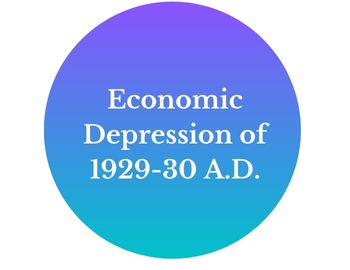Economic Depression of 1929-30:
In his analysis of the nature and character of capital, Marx had clarified that the development of capitalism implied a cycle of economic crises. The profit which is a factor of development is a personal matter and needs no social sanctions. Therefore, sometimes there is inflation, sometimes depression and sometimes other deformities of production and distribution rise to the forefront. This cycle is essential whatever may be its interval.
During the war, there was a spurt in economic activity in the countries engaged in war, but it disappeared with the cessation of war leaving tens of thousands of people employed. Retrenchment in the army and factories became inevitable both in the victorious and the vanquished countries. The basic problem was how to put so many people to useful productive work so that they might earn a living. Another problem was that the additional taxes that had been imposed during the war had to be withdrawn, but the economic condition of the states did not allow them to do so. To improve the condition countries began to reduce their imports. But how to increase exports when all the countries were limiting imports? In the meantime, the gold of all the world had drained to America. It may be recalled that during the early years of World War I America followed the policy of neutralism and earned a huge profit from wartime production. In spite of all this accumulation of gold the economic condition of America was tottering. In spite of the surprising rise in the rate of profit neither the wages were raised nor the prices were reduced, the production also remained uncontrolled. All these factors made the present condition inevitable. The American producers had developed a tendency for over-production. When the demand began to fall after the war, the manufactured goods began to pile up. This made retrenchment inevitable. This cycle went on. There was pressure to reduce production. The vicious economic circle of depression had set in. The unemployment among the workers rose, their per capita income began to fall and purchasing power diminished. All these causes brought about the economic depression.
When the companies were making huge profits, the prices of the shares went up and the people invested all their savings into the share market. In 1929, when the share prices were very high some people grew apprehensive and began to sell their shares. This caused a panic. On October 24, 1929, the American share market (Wall Street) suddenly collapsed and the shareholders had to suffer a loss of 500 million dollars in a day.
This sent a tremor throughout the world. The savings of tens of thousands of people sank. Unemployment and economic insecurity began to grow every day. The extent of disparity and anarchy could be gauged from the example of 5 million black American citizens whose condition in an advanced country like America became worse than that of animals and this was all due to starvation caused by unemployment. Not only this, the anti-social activities of the White fanatics of the Ku Klux Klan were on the increase. The business of illicit liquor was expanding. The notorious maffia Al Capo became a multi-millionaire in this trade. The power of big capitalists increased. In 1929, 5 per cent of owners grabbed 84% of total profits. In other words, disruption and disorder in society were on the increase.
The changed conditions made life insecure. There was no money and whatever it was, it had no value. In Germany, one could not get even a meal for a suitcase full of marks. The value of money was less than that of the paper on which it was printed. This economic crisis was unprecedented.
Hit by the worldwide economic crisis the American capitalists completely stopped lending money or investing it in foreign lands. Several large banks and financial institutions were caught in a crisis. The most devastatingly affected countries in this process were Austria and Germany.
Thus the whole world collapsed under the economic depression of 1929-1933. International trade came to a standstill and production dropped to its lowest level. The index number of production in England was 900 in 1928 which fell to 50 in 1931. The countries that had contracted loans were not able to repay them. Communism gained in popularity and the League of Nations was hit hard.









Comments (No)